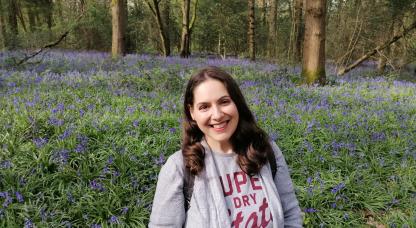Dr Cora Sargeant explores how she and her loved ones take on MS monsters through podcasting, creative writing and psychology.
Creative writing and podcasting help to battle my MS monsters
16 February 2023

My journey with writing is a strange one, to be honest. I’m a scientist at the University of Southampton, where alongside my long-time friend and mentor Dr Sarah Wright, I run the EP Gender Research Group. Together, we write and publish research about gender identity.
I’m also a chartered Educational Psychologist, where I help children and young people to be better included in school. I write reports that help to understand a child or young person’s needs and to guide school staff to meet them. In psychology, writing had been fundamental to my identity.
After my diagnosis I started reading every medical article I could find.
Psychologically, I was sprinting to outpace the attacks, to outpace my fear.
I was learning all I could, reading about the difficult futures MS can promise, constantly thinking about how I could manage with worsening disability.
It didn't work. The more I read, the more anxious I became. Treatment efficacy, side effects, risks, none of the medical writing made my situation any more certain or made me any less anxious.
I slowly started to realise that MS wasn’t just a medical challenge, it was a psychological one.
Luckily, I’m a psychologist.
So, I got to work. I delved deeper into the psychological research on MS to find out how people thrive in the context of multiple sclerosis and how to cultivate the garden of my mental health.
I started my podcast ‘Sciencing the S**t out of MS’. Each fortnight, I explore psychology research to come away with a new seed to plant, that will help me to grow psychologically.
If I’m physically deteriorating but psychologically growing, I’ll take that trade.
It turns out that creativity is a great seed to plant, so I started to write. I don’t write a lot, but sometimes there’s an experience that compels me to write, and this one was a good example.
I often think of MS and its challenges as creatures, like I'm being preyed upon by monsters, that the damages I've sustained are the literal scars from our previous encounters.
These creatures are primal, instinctive, dangerous, but they don't know any better. We can't be angry with them for their nature, and we can learn to live with them.
Even better, fighting monsters is what heroes do.
Our monsters don't hold back, they're real, and only in that genuinely life-threatening context can we find out what we're truly capable of.
This little story isn't about me. The hero of this story is Caroline, the most wonderful person and a truly admirable adventurer to fight alongside.
We play Dungeons and Dragons together. More than anything, the game teaches us that any foe is easier to overcome with the right allies by your side.
I have the best allies.
Dr Cora Sargeant's story
I wanted to share a conversation I had with a friend recently who said it must be hard during a relapse. I disagreed; the relapses aren't what I find hard.
I mean, they are difficult but when they happen, I'm under attack, I know my enemy, and I know how and what to fight.
When my enemy finds me, it actively tries to stop me doing the things I love, placing new barriers between them and me. I'm getting good at this battle, crafting inventive weapons, overcoming each new obstacle; these moments aren't what I find hard.
What I find hard are the quiet moments. The quiet feels tense, as though my enemy isn't dormant but waiting, stalking me.
Each blur of my vision akin to a moving shadow, each muscular twinge a twitch of a branch, each unsteady slip a rustle of nearby leaves. In my worst moments I see my foe everywhere.
I turn in circles with my sword outstretched, my hand trembling at its hilt tempted to swing out pre-emptively, instinctively, wildly at some imminent imagined attack.
I dare not rest, much less sleep, for fear my vigil might somehow keep my enemy at bay, as though it only hesitates while waiting for my defences to falter.
Then my wife holds my hands and looks into my eyes. 'You are safe, you are loved, you are Cora.' The world comes back into view, my imagined foe retreats, my fists unclench.
A breath of wind and the leaves rustle but she holds my gaze; she is beautiful and the love in her eyes stills my breath, steadies my pulse.
My enemy will come again truly, and I know this, but for now I must trust to hope, to quell the shadow, to lower my guard.
'What is hard about this disease isn't the relapses' I say to my friend, 'it’s the quiet moments; it can be hard to find peace'. They frown and nod.
They have no idea.
Listen to Dr Cora Sargeant's podcast - Sciencing the S**t out of MS
Latest news & stories
Sign up to updates from us
Keep up-to-date with the latest MS news, explore new research, read the stories of people living with MS, find out practical tips from MS experts, and discover exciting fundraising opportunities
If you would like to sign up for post or telephone (SMS) updates you can complete our sign up form here


